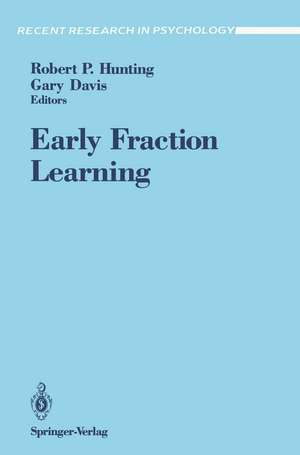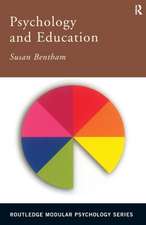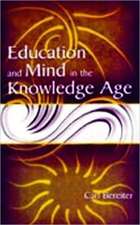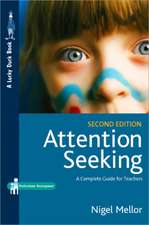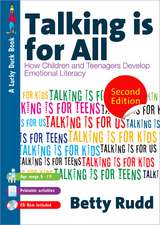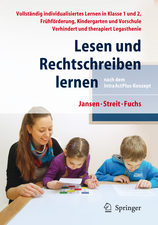Early Fraction Learning: Recent Research in Psychology
Editat de Robert P. Hunting, Gary Davisen Limba Engleză Paperback – oct 1991
Din seria Recent Research in Psychology
- 15%
 Preț: 632.37 lei
Preț: 632.37 lei -
 Preț: 379.86 lei
Preț: 379.86 lei - 15%
 Preț: 637.13 lei
Preț: 637.13 lei -
 Preț: 377.73 lei
Preț: 377.73 lei - 15%
 Preț: 631.40 lei
Preț: 631.40 lei -
 Preț: 382.36 lei
Preț: 382.36 lei - 15%
 Preț: 635.65 lei
Preț: 635.65 lei - 15%
 Preț: 642.36 lei
Preț: 642.36 lei - 15%
 Preț: 634.18 lei
Preț: 634.18 lei -
 Preț: 392.60 lei
Preț: 392.60 lei - 15%
 Preț: 637.59 lei
Preț: 637.59 lei - 15%
 Preț: 635.65 lei
Preț: 635.65 lei - 15%
 Preț: 634.49 lei
Preț: 634.49 lei - 15%
 Preț: 645.47 lei
Preț: 645.47 lei - 20%
 Preț: 440.22 lei
Preț: 440.22 lei - 15%
 Preț: 653.33 lei
Preț: 653.33 lei - 5%
 Preț: 712.60 lei
Preț: 712.60 lei - 15%
 Preț: 634.68 lei
Preț: 634.68 lei - 18%
 Preț: 950.96 lei
Preț: 950.96 lei - 15%
 Preț: 639.59 lei
Preț: 639.59 lei - 15%
 Preț: 634.00 lei
Preț: 634.00 lei - 15%
 Preț: 636.80 lei
Preț: 636.80 lei - 18%
 Preț: 724.00 lei
Preț: 724.00 lei - 15%
 Preț: 642.18 lei
Preț: 642.18 lei - 15%
 Preț: 635.15 lei
Preț: 635.15 lei - 15%
 Preț: 639.08 lei
Preț: 639.08 lei - 15%
 Preț: 638.76 lei
Preț: 638.76 lei - 15%
 Preț: 640.55 lei
Preț: 640.55 lei - 15%
 Preț: 637.28 lei
Preț: 637.28 lei - 15%
 Preț: 630.57 lei
Preț: 630.57 lei - 15%
 Preț: 636.80 lei
Preț: 636.80 lei - 15%
 Preț: 638.57 lei
Preț: 638.57 lei - 15%
 Preț: 633.02 lei
Preț: 633.02 lei - 15%
 Preț: 647.08 lei
Preț: 647.08 lei - 15%
 Preț: 649.71 lei
Preț: 649.71 lei - 15%
 Preț: 637.93 lei
Preț: 637.93 lei - 15%
 Preț: 634.18 lei
Preț: 634.18 lei - 15%
 Preț: 632.37 lei
Preț: 632.37 lei -
 Preț: 376.80 lei
Preț: 376.80 lei - 15%
 Preț: 644.18 lei
Preț: 644.18 lei - 15%
 Preț: 640.55 lei
Preț: 640.55 lei - 15%
 Preț: 637.78 lei
Preț: 637.78 lei -
 Preț: 377.57 lei
Preț: 377.57 lei - 15%
 Preț: 635.15 lei
Preț: 635.15 lei - 18%
 Preț: 946.87 lei
Preț: 946.87 lei - 15%
 Preț: 647.27 lei
Preț: 647.27 lei - 15%
 Preț: 633.53 lei
Preț: 633.53 lei
Preț: 638.43 lei
Preț vechi: 751.10 lei
-15% Nou
Puncte Express: 958
Preț estimativ în valută:
122.17€ • 130.64$ • 101.86£
122.17€ • 130.64$ • 101.86£
Carte tipărită la comandă
Livrare economică 17 aprilie-01 mai
Preluare comenzi: 021 569.72.76
Specificații
ISBN-13: 9780387976419
ISBN-10: 0387976418
Pagini: 236
Ilustrații: XVII, 236 p. 1 illus.
Dimensiuni: 155 x 235 x 14 mm
Greutate: 0.36 kg
Ediția:1991
Editura: Springer
Colecția Springer
Seria Recent Research in Psychology
Locul publicării:New York, NY, United States
ISBN-10: 0387976418
Pagini: 236
Ilustrații: XVII, 236 p. 1 illus.
Dimensiuni: 155 x 235 x 14 mm
Greutate: 0.36 kg
Ediția:1991
Editura: Springer
Colecția Springer
Seria Recent Research in Psychology
Locul publicării:New York, NY, United States
Public țintă
ResearchCuprins
1. Introduction.- References.- 2. Pre-fraction Concepts of Preschoolers.- Method.- Results.- Discussion.- References.- 3. Dimensions of Young Children’s Conceptions of the Fraction One Half.- Theory.- Method.- Results.- Discussion.- References.- 4. The Social Origins of Pre-fraction Knowledge in Three Year Olds.- Method.- Results.- General Discussion.- References.- 5. Higher Order Thinking in Young Children’s Engagements with a Fraction Machine.- The Copy Cat Fraction Machine.- Copy Cat Performance.- Counting Performance.- Relationships Between Copy Cat Performance and Counting.- The Case of Jayme and One-third.- 6. Fractions as Operators and as Cloning Machines.- The Rational Numbers as Operators.- Fraction Algorithms and Abstract Symbolism.- A More General Construction of Fields of Fractions via Operators.- References.- 7. Preschoolers’ Knowledge of Counting and Sharing in Discrete Quantity Settings.- Counting.- The Theory of Counting Types.- Sharing in Discrete Quantity Settings.- The Link Between Counting and Sharing.- The Counting Tasks.- The Sharing Tasks.- Classification Criteria.- Counting Tasks.- Sharing Tasks.- Observed Frequencies for Counting and Sharing.- Poor Counters but Good Sharers.- Good Counters but Weak Sharers.- 8. Preschoolers’ Spontaneous Partitioning of Discrete Items.- References.- 9. Cognitive Issues about Dealing.- Dealing and Counting.- Commentary on Tom’s Responses.- Cognitive and Problem Solving Aspects of Tom’s Responses.- General Discussion.- References.- 10. Sharing by Dealing as Problem Solving.- A Sharing Problem.- Children’s Strategies.- Conclusions.- References.- 11. Cognitive Research on Early Fraction Learning Applied to Classrooms: Two Experiments.- I. An Experiment in Teacher-focused Curriculum Change.- II. Applyingthe Didactic Framework.- References.- Appendix: Fractions and Sharing Interview.- 12. The Interaction of Thought, Words, and Deeds in Children’s Early Fraction Learning.- The Problem.- What the Interviews Revealed.- Concluding Comments.- References.- 13. On Clinical Methods for Studying Young Children’s Mathematics.- Examples of Recent Adaptations.- Artifacts of the Clinical Interview.- References.- 14. A Fraction of Epistemology.- Relations and Reality.- Order and Symmetry Breaking.- Reflection, Disequilibrium, and the Transition to Order.- Information and Action.- The Idea of a Concept.- References.
